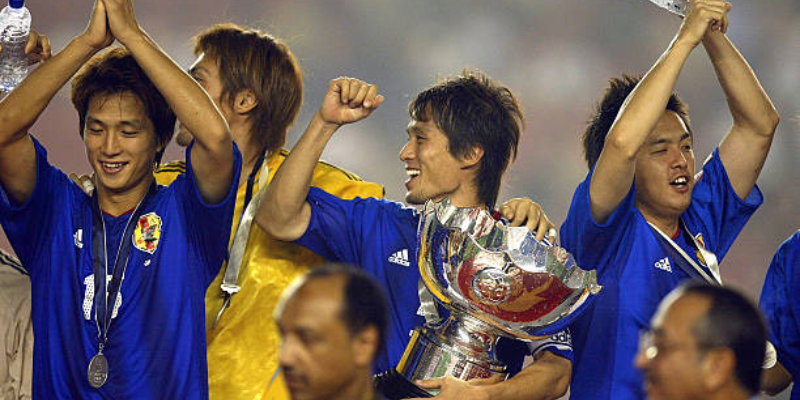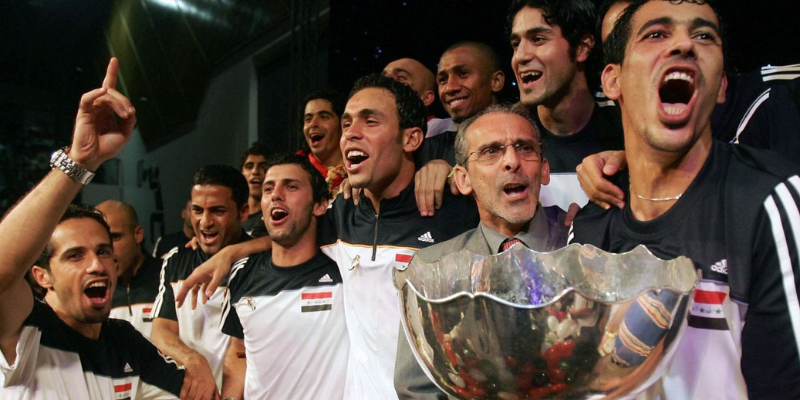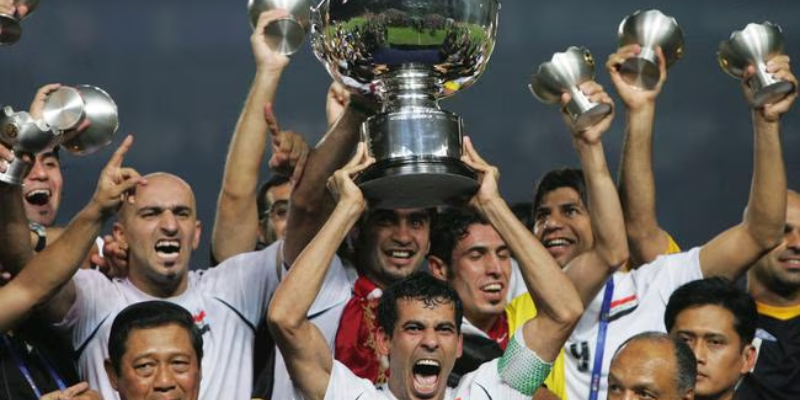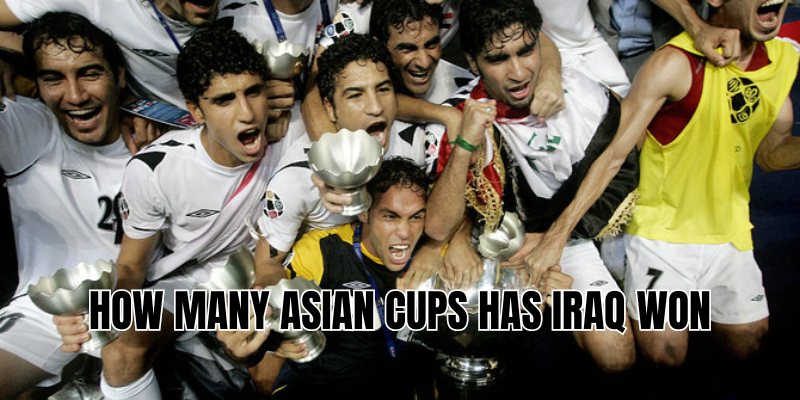In this article, ZizaGoal will explore how many Asian Cups has Iraq won — and why that single triumph in 2007 still echoes as one of football’s most unforgettable stories. The short answer? Iraq has won the AFC Asian Cup once, in 2007. But the full story behind that victory, and its wider significance, adds a whole lot more drama, inspiration, and context.
Iraq’s Asian Cup Journey: Appearances and Performances

Iraq have participated in the AFC Asian Cup finals ten times: first in 1972 and 1976, and then consistently. Their progress beyond the group stage was rare — and their 2007 campaign remains the highlight of their continental history.
Here’s a quick snapshot of their performance over the key editions:
- 1972: Group stage
- 1976: Fourth place
- 1996, 2000, 2004: Reached quarter-finals
- 2007: Champions
- 2011, 2015, 2019, 2023: Knockout round exits or group stage departures
The 2007 Triumph: More Than Just A Trophy

When we look more closely at how many Asian Cups Iraq has won, the number “one” might seem modest — but the journey behind it was monumental.
Against the Odds
Iraq’s 2007 Asian Cup win wasn’t just a football achievement — it was a tale of resilience, hope, and national unity. The country was in the grip of war and internal strife, and the national team was training abroad under extreme conditions.
There were logistical nightmares, security threats, and uncertainty right up to the final match. At one point, the team nearly withdrew after bombings targeted fans celebrating their semi-final win.
The Final: A Moment of History
On July 29, 2007, in Jakarta’s Gelora Bung Karno Stadium, Younis Mahmoud rose to head home the winner from a corner delivered by Hawar Mulla Mohammed, sealing a 1–0 victory over Saudi Arabia and Iraq’s first-ever Asian Cup title.
Mahmoud’s header wasn’t just a goal — it became an iconic image, representing more than football: it symbolized pride, defiance, and unity for a fractured nation. The win also earned Iraq a spot in the 2009 FIFA Confederations Cup.
Legacy and Impact
- The 2007 victory is widely regarded as one of Asia’s greatest underdog stories in international football.
- It helped foster a rare moment of national solidarity in Iraq, as fans.
- -, and division — turning into a source of hope on the world stage.
Why Iraq Haven’t Won More

So if Iraq won the Asian Cup once in 2007, why haven’t they repeated that success? There are several reasons:
- Structural challenges: Years of conflict have disrupted Iraqi football infrastructure, youth development, and domestic leagues, making consistent high-level preparation difficult.
- Tough competition: The Asian Cup features powerhouses like Japan, South Korea, Iran, Saudi Arabia, and Australia — all of which have dee.
- Inconsistency and instability: Political turmoil, coaching changes, and logistical hurdles have often undermined Iraq’s ability to build on successes. Even in subsequent tournaments, they entered underprepared or under stress, which impacted performance.
Other Titles And AFC Achievements
While Iraq’s tally in the Asian Cup remains at one, the national team has won other regional tournaments, which reflect their competitive pedigree in Asia and the Middle East:
- Arabian Gulf Cup: Multiple titles
- West Asian Championship: At least one win
- Asian Games football gold medal: Once
- Arab Cup: Several victories
These honours show that Iraq have had success on regional and subcontinental stages — even if the Asian Cup remains elusive beyond their 2007 peak.
The 2007 Squad: Heroes of the Tournament
The success of the 2007 Asian Cup was built on a squad full of grit, talent, and national pride. Some of the standout figures include:
- Younis Mahmoud – Captain and star striker, whose winning goal in the final remains etched in Asian Cup history.
- Nashat Akram – Midfield dynamo, often credited with creative control and drive behind Iraq’s tactical game. He was named Player of the Tournament.
- Noor Sabri – Goalkeeper whose saves were crucial in tight knockout matches and who later won AFC’s best goalkee.
- Hawar Mulla Mohammed and Karrar Jassim – Players who provided key assists and structure in transition, helping Iraq move up the pitch effectively.
These players weren’t just footballers — they became symbols of perseverance and hope for millions watching back home and abroad.
How Iraq’s 2007 Win Changed Asian Football
Iraq’s win didn’t happen in a vacuum. It shifted how the continent viewed smaller or crisis-affected teams, proving that:
- Football success isn’t always tied to infrastructure or political peace. Even teams. The Asian Cup could be a platform for redemption and unity, not just sport — a tournament where political divisions can momentarily fall away.
- Iraq’s story inspired other “underdog” teams across Asia to believe in their potential, regardless of external challenges. Their success added a narrative layer to future Asian Cups: that of hope, resilience, and surprise.
The 2007 tournament is now remembered not just for the matches, but for the many stories that unfolded off the pitch — stories of displacement, exile, fan tragedy, and finally, triumph. The Asian Football Confederation itself has highlighted Iraq’s campaign as one of the most remarkable in tournament history.
Statistical Snapshot
Here’s a quick breakdown of Iraq’s Asian Cup record:
- Asian Cup titles: 1 (2007)
- Final appearances: 1 (2007)
- Other best finishes: Fourth place (1976)
- Total appearances: 10 finals (from 1972 to 2023)
- Knockout stage advances: Quarter-finals or better in 1996, 2000, 2004, 2007 — but only once progressing to the final.
Looking Forward: Can Iraq Win Another Asian Cup?
The question now is: Can Iraq do it again? Given the shifting landscape of Asian football — with more competitive teams, better preparation, and heightened expectations — a repeat is far. But there are signs of promise:
- Iraq’s footballing talent continues to emerge, and players like Aymen Hussein and others have shown glimpses of high-level potential.
- The national team has drawn lessons.
- If Iraq can stabilize their preparation, invest in youth development, and sustain a coherent coaching setup, the blueprint for another title remains possible — especially considering how their 2007 win came against all odds.
However, to truly contend, Iraq will need to rely not just on emotion and grit, but also on the infrastructure, tactical professionalism, and consistency that characterize modern successful teams.
Conclusion
How many Asian Cups has Iraq won? The answer is simple: one — the iconic 2007 AFC Asian Cup triumph. But that solitary title carries far more weight than the number suggests. It represents a moment when football became a unifying force, a public symbol of hope, and a statement of defiance, Iraq’s 2007 campaign remains more than just a statistic — it’s a chapter in the sport’s most emotionally powerful narrative arcs.
If you want to dive dee, or compare Iraq’s performance with other Asian Cup champions, keep following ZizaGoal — your go-to hub for football history, match analysis, and unforgettable stories







